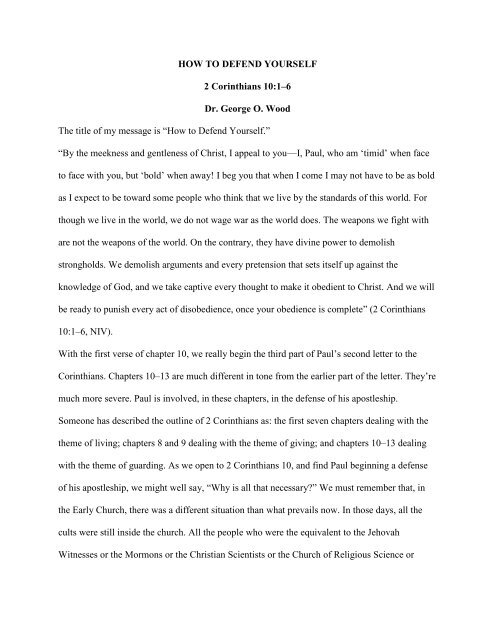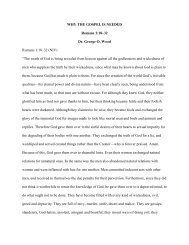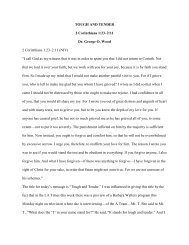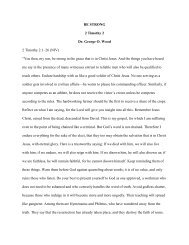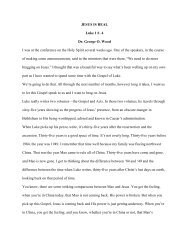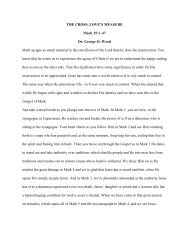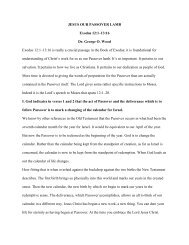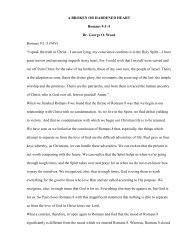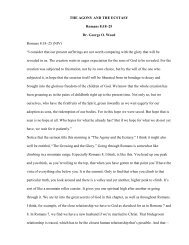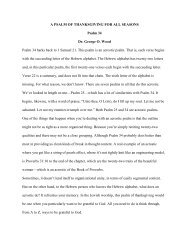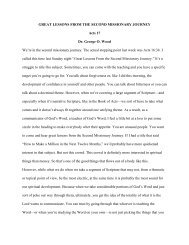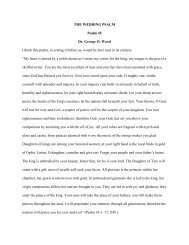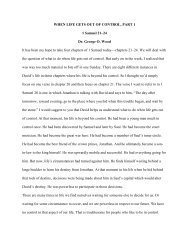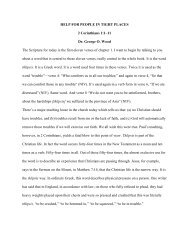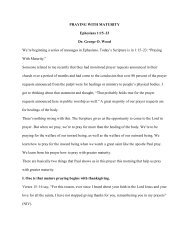How to Defend Yourself. - Dr. George O. Wood
How to Defend Yourself. - Dr. George O. Wood
How to Defend Yourself. - Dr. George O. Wood
Create successful ePaper yourself
Turn your PDF publications into a flip-book with our unique Google optimized e-Paper software.
HOW TO DEFEND YOURSELF<br />
2 Corinthians 10:1–6<br />
<strong>Dr</strong>. <strong>George</strong> O. <strong>Wood</strong><br />
The title of my message is ―<strong>How</strong> <strong>to</strong> <strong>Defend</strong> <strong>Yourself</strong>.‖<br />
―By the meekness and gentleness of Christ, I appeal <strong>to</strong> you—I, Paul, who am ‗timid‘ when face<br />
<strong>to</strong> face with you, but ‗bold‘ when away! I beg you that when I come I may not have <strong>to</strong> be as bold<br />
as I expect <strong>to</strong> be <strong>to</strong>ward some people who think that we live by the standards of this world. For<br />
though we live in the world, we do not wage war as the world does. The weapons we fight with<br />
are not the weapons of the world. On the contrary, they have divine power <strong>to</strong> demolish<br />
strongholds. We demolish arguments and every pretension that sets itself up against the<br />
knowledge of God, and we take captive every thought <strong>to</strong> make it obedient <strong>to</strong> Christ. And we will<br />
be ready <strong>to</strong> punish every act of disobedience, once your obedience is complete‖ (2 Corinthians<br />
10:1–6, NIV).<br />
With the first verse of chapter 10, we really begin the third part of Paul‘s second letter <strong>to</strong> the<br />
Corinthians. Chapters 10–13 are much different in <strong>to</strong>ne from the earlier part of the letter. They‘re<br />
much more severe. Paul is involved, in these chapters, in the defense of his apostleship.<br />
Someone has described the outline of 2 Corinthians as: the first seven chapters dealing with the<br />
theme of living; chapters 8 and 9 dealing with the theme of giving; and chapters 10–13 dealing<br />
with the theme of guarding. As we open <strong>to</strong> 2 Corinthians 10, and find Paul beginning a defense<br />
of his apostleship, we might well say, ―Why is all that necessary‖ We must remember that, in<br />
the Early Church, there was a different situation than what prevails now. In those days, all the<br />
cults were still inside the church. All the people who were the equivalent <strong>to</strong> the Jehovah<br />
Witnesses or the Mormons or the Christian Scientists or the Church of Religious Science or
HOW TO DEFEND YOURSELF<br />
2 Corinthians 10:1–6<br />
whatever—who had far different views of Jesus than what was taught by the apostles or by Jesus<br />
himself—still were within the membership of the church, combating or rivaling one another, if<br />
you will, for position and for being claimants <strong>to</strong> the ones who really had right doctrine. It was<br />
necessary, therefore, for the apostles <strong>to</strong> defend the truth that Jesus had delivered <strong>to</strong> them<br />
regarding what is true and genuine worship <strong>to</strong>ward God.<br />
Therefore, at Corinth, there had been a real attack against Paul‘s apostleship from those kinds of<br />
groups that <strong>to</strong>day would really be on the outside of the body of Christ looking in. They‘d be<br />
better identified and labeled <strong>to</strong>day than they were then.<br />
There are really two kinds of conflicts that happen in churches. One type of conflict is a<br />
substantive kind of conflict, which deals with matters of doctrine and truth. Another kind of<br />
conflict is simply interpersonal. It‘s due <strong>to</strong> personality conflicts. The type of conflict at Corinth is<br />
one that is substantive in character.<br />
In verses 1–6, you can read between the lines and very clearly see in these six verses that two<br />
things are being said against the apostle. One is that he is rather bold in his letters, but rather<br />
timid and non-forceful when you see him in person. Paul evidently was not all that impressive a<br />
personality. That was one of the criticisms against him. He really is strong when you meet him in<br />
his letters, but when you see him face <strong>to</strong> face he‘s really not all that impressive.<br />
People are often looking for leaders that look like leaders. Whether they are leaders or not, it<br />
doesn‘t matter. Today we expect somebody who‘s president <strong>to</strong> look ―presidential.‖ We expect<br />
somebody who‘s a United States sena<strong>to</strong>r <strong>to</strong> look like a United States sena<strong>to</strong>r. We expect<br />
someone in a place of religious authority <strong>to</strong> look like he is a person of religious authority.<br />
Paul evidently didn‘t look like much like a religious leader. In fact, one of the works of the early<br />
second century that describes the physical appearance of the apostle Paul notes that he is short,<br />
2
HOW TO DEFEND YOURSELF<br />
2 Corinthians 10:1–6<br />
balding and bowlegged, or bandy-legged. Not all that impressive a visage. This is one of the<br />
criticisms against him—―He doesn‘t look like much of a leader when you see him face <strong>to</strong> face.‖<br />
That, of course, teaches us <strong>to</strong> exercise caution that we don‘t fall in<strong>to</strong> the same trap of assuming<br />
that simply because a person looks like a leader, therefore, it means that they are a leader.<br />
A second charge against Paul was that whatever he did, he did out of selfish interests. He lived<br />
according <strong>to</strong> the standards of this world. The word literally is ―He lived according <strong>to</strong> the flesh.‖<br />
He lived according <strong>to</strong> worldly standards. Therefore, he was in it for himself. Whatever he had <strong>to</strong><br />
offer the church was simply based on the selfish motive that he had.<br />
This is therefore a thing which he must respond <strong>to</strong>, the authority of right doctrine is <strong>to</strong> be kept<br />
within the church. We may know all those things his<strong>to</strong>rically. Maybe when we get done with it,<br />
we adopt an attitude like I adopted after I got done with the early part of my message<br />
preparation, doing the kind of Bible study work necessary <strong>to</strong> sort of flesh out the text. You stand<br />
back from it, and you realize you‘re going <strong>to</strong> stand up on Sunday morning and preach <strong>to</strong> people<br />
with twentieth-century problems, and you‘re dealing with a first-century issue of apos<strong>to</strong>lic<br />
authority. You come <strong>to</strong> the whole bot<strong>to</strong>m line and you say, ―So what‖<br />
So, what does it mean <strong>to</strong> anybody that Paul successfully defended his apostleship twenty<br />
centuries ago So what Yeah, we have the New Testament and we wouldn‘t have had it if he<br />
hadn‘t had done it, but so what <strong>How</strong> does that relate <strong>to</strong> me It seemed <strong>to</strong> me, when I read it with<br />
that kind of a question in mind, that some really dynamic new truths opened up for me. That is<br />
simply that all of us as Christians find times in our life where we need <strong>to</strong> defend ourselves when<br />
we are under attack. There are even times when we have a fight with someone. We‘ve always<br />
been <strong>to</strong>ld that Christians never argue with anybody. Christians never fight with anyone. But the<br />
New Testament is filled with evidence that sometimes that‘s the case over even substantive<br />
3
HOW TO DEFEND YOURSELF<br />
2 Corinthians 10:1–6<br />
issues. Sometimes, it‘s simply over personality, interpersonal issues. But we ought <strong>to</strong> have some<br />
ground rules on how <strong>to</strong> have a Christian fight. <strong>How</strong> do you go about defending yourself<br />
This Scripture has some great truths for us <strong>to</strong> use in this whole art of ―how <strong>to</strong> have a Christian<br />
fight‖ or ―how <strong>to</strong> defend yourself.‖ I want <strong>to</strong> divide this message in<strong>to</strong> two broad areas.<br />
I. First, I want <strong>to</strong> talk about what Paul did not do in defending himself.<br />
As you read verses 1–6 and on through 10–13, you‘ll find there are some methods he did not<br />
employ, which, from time <strong>to</strong> time, I‘ll be frank <strong>to</strong> confess, I have employed in defending<br />
myself—much <strong>to</strong> my shame.<br />
A. The first thing Paul did not do is throw his weight around. He did not begin defending himself<br />
by throwing his weight around. He did not say, ―You Corinthians! I‘m an apostle and I‘ve<br />
spoken on this issue and that ought <strong>to</strong> settle it. I‘m the authority around here and I don‘t have <strong>to</strong><br />
give you reasons for anything I believe or anything I do. It‘s taken on faith, brothers and sisters.<br />
God made me the authority. It‘s up <strong>to</strong> you <strong>to</strong> listen and come under it. Accept me and what I say<br />
and that‘s it. If you doubt it, I‘ve got the last word. I am the authority.‖<br />
You say, how would I apply that on a personal level <strong>How</strong> about an argument between a<br />
husband and wife, where the husband finally gets exasperated and says, ―I‘m the head of this<br />
house. That‘s the way it‘s going <strong>to</strong> be, whether you like it or not‖ That is throwing your weight<br />
around, guys.<br />
Someone may give money <strong>to</strong> a ministry. Fortunately, <strong>to</strong> my knowledge, this has never happened<br />
in this church body, thanks <strong>to</strong> God, but I know of cases where a person may have invested in the<br />
work of the King and then they come back later and say, ―I gave so much money <strong>to</strong> that ministry<br />
and this is what I want it <strong>to</strong> do. If you don‘t, I‘m going <strong>to</strong> yank the rug out from under you.‖<br />
Throwing your weight around.<br />
4
HOW TO DEFEND YOURSELF<br />
2 Corinthians 10:1–6<br />
There‘s a favorite Scripture that pas<strong>to</strong>rs use when they‘re asked questions and their authority is<br />
questioned. I had a friend who was being challenged in something. I made a prediction <strong>to</strong> myself<br />
about maybe what his sermon was going <strong>to</strong> be the next Sunday morning, and I was right. I<br />
guessed it—―Touch not the Lord‘s anointed‖ (1 Samuel 24:6). That‘s a favorite text of preachers.<br />
When you look through the New Testament, you will never find a New Testament leader ever<br />
appealing <strong>to</strong> that Old Testament Scripture <strong>to</strong> support their position. That is a valid principle—not<br />
<strong>to</strong> <strong>to</strong>uch the Lord‘s anointed—but in the New Testament sense, we‘re all the Lord‘s anointed and<br />
we ought not <strong>to</strong>uch one another in that kind of a sense (1 John). But you do not have a defense, a<br />
Christian defense, that begins by simply throwing your weight around.<br />
B. The second technique that Paul does not use is that he does not try <strong>to</strong> manipulate others<br />
through self-pity. This is a common technique when we get in<strong>to</strong> some kind of conflict. ―You<br />
ought <strong>to</strong> be ashamed of yourself for what you‘re doing <strong>to</strong> me! Do you know how hard I‘ve<br />
worked for you Do you know all I‘ve done for you this week If you only knew! Shame! I<br />
worked my fingers <strong>to</strong> the bone. You should have more appreciation for me than you have.‖ Of<br />
course, that‘s a technique that does two things. It dumps blame on another person, and it appeals<br />
<strong>to</strong> their pitying you. So you are appealing <strong>to</strong> self-pity. Paul does not do this. ―Look at what a<br />
good apostle I am for you. I laid down my life for you. Remember how I worked among you—<br />
my concerns have been for all the churches. You shouldn‘t really be occupying my time by<br />
getting me involved in these kinds of problems. Shame on you. No decent church would treat an<br />
apostle the way you‘re treating me. Nothing like this.‖<br />
The first thing he repudiates, as a method of engaging in defense, is the idea of throwing in the<br />
<strong>to</strong>wel of Christian service because somebody else had been unkind or unfair <strong>to</strong> him. That‘s often<br />
5
HOW TO DEFEND YOURSELF<br />
2 Corinthians 10:1–6<br />
the case when we get treated unkindly or unfairly. We say, ―See if I ever do that again! That‘s<br />
what I get for being nice. That‘s what I get for giving my time.‖<br />
<strong>How</strong> many times has the devil used, as a strategy in the church, the whole fresh volunteer spirit<br />
of someone whom the Lord has <strong>to</strong>uched, who gets involved in the church, gets involved in<br />
teaching a Sunday School class, gets involved in this ministry or that ministry. They get involved<br />
and, before you know it, somebody comes along and criticizes them for what they‘re doing. They<br />
say, ―I‘m not even getting paid for this! Forget it.‖ And they throw in the <strong>to</strong>wel of Christian<br />
service. Paul doesn‘t say, ―I‘m tired of all of this and I‘ll throw in my apostleship. This isn‘t<br />
worth it. I‘m a tent maker. I‘m capable of supporting myself. What am I doing this for‖ He<br />
doesn‘t use those techniques <strong>to</strong> defend himself.<br />
II. <strong>How</strong> does he defend himself Three positive steps are used.<br />
A. The first is found in verse 1. He follows the Lord‘s example in defending himself, ―By the<br />
meekness and gentleness of Christ, I appeal <strong>to</strong> you.‖ <strong>How</strong> did the Lord minister <strong>How</strong> did He<br />
defend himself Not with threats, braggadocio, bluster, not with saying ―I‘ll get even with you<br />
for this!‖ The Lord says, in Matthew 11:28, ―I am meek and lowly of heart.‖ Jesus sought <strong>to</strong><br />
resolve conflict, not on the power level, but on the love level. Through the meekness and<br />
gentleness of Christ.<br />
Those two words reflect the style of the Lord‘s example in defending ourselves.<br />
―Meekness‖—probably what most of us think of when we first come <strong>to</strong> that word meekness is<br />
―weakness,‖ ―timidity,‖ a milque<strong>to</strong>ast kind of personality. It‘s really regrettable that the biblical<br />
word that‘s used in the English, ―meekness,‖ comes across that way, because it‘s a far stronger<br />
word. But there are so many complex ideas associated with the word that there is no one English<br />
word that adequately translates what underlies this word. Some of the concepts the Greeks use in<br />
6
HOW TO DEFEND YOURSELF<br />
2 Corinthians 10:1–6<br />
underlying the word Paul uses for meekness is the idea of a wild horse that has been broken, so<br />
that now its energies are channeled under a bit and bridle and saddle. It isn‘t going off in all<br />
directions. It has a controlled response. Its energies are being used in a disciplined sense.<br />
Aris<strong>to</strong>tle used the word <strong>to</strong> describe the medium between two extremes.<br />
In taking this and putting it in<strong>to</strong> the biblical text, a meek person is a person of strength, a person<br />
whose core or fiber is steel—that has a <strong>to</strong>uch of velvet, if you would allow that kind of<br />
illustration—who has a controlled and discipled response, and is seen as responding <strong>to</strong><br />
difficulties with a soft <strong>to</strong>uch. But that soft <strong>to</strong>uch shouldn‘t be misread as being weakness or<br />
failure, <strong>to</strong> have no backbone, because underneath that strong <strong>to</strong>uch is a resolve of steel.<br />
Paul uses the word some eight times in his thirteen letters. Meekness is the eighth fruit of the<br />
spirit in Galatians 5:23. It is the necessary quality for res<strong>to</strong>ring someone who has fallen.<br />
Galatians 6:1 says, ―You who are spiritual ought <strong>to</strong> res<strong>to</strong>re that individual in a spirit of<br />
meekness.‖ It is a spirit that one who corrects false teachers should have. 2 Timothy 2:25 says,<br />
―Those who oppose the Lord‘s service he must meekly instruct.‖ Why would you want <strong>to</strong> use the<br />
word ―meekly‖ in regard <strong>to</strong> apologetics, defending the faith against false teachers<br />
Because your purpose in giving a theological argument, your purpose in defending your faith, is<br />
not <strong>to</strong> win the argument but <strong>to</strong> win the other person. The presence of meekness in your life gives<br />
you the power not <strong>to</strong> blow another person up, but <strong>to</strong> build another person up. So many times,<br />
when we get in<strong>to</strong> a standoff with somebody, we want <strong>to</strong> blow them out of the water. And we<br />
want <strong>to</strong> blow their argument out of the water. But the Christian purpose is not <strong>to</strong> blow somebody<br />
up, but <strong>to</strong> build somebody up. Meekness is that attribute that helps us do that.<br />
In fact, the word ―meekness‖ is frequently used in conjunction with two other words, ―humility‖<br />
and ―patience.‖ You see this especially in Ephesians 4:2, where Paul says, ―Be completely<br />
7
HOW TO DEFEND YOURSELF<br />
2 Corinthians 10:1–6<br />
humble and meek. Be patient, bearing with one another in love.‖ Those words of ―humility‖ and<br />
―patience‖ are kind of like the sandwich words, with ―meekness‖ in the center. They condition it.<br />
So following the example of Christ means we approach differences with a spirit of meekness, not<br />
a spirit of throwing our weight around. It also means we approach those matters with a spirit of<br />
gentleness. The underlying Greek word is used six times in the New Testament, and it conveys<br />
the idea of a person who is not harsh, but who is willing <strong>to</strong> give the other person the benefit of<br />
the doubt, who is willing <strong>to</strong> give clemency. A person who doesn‘t have this quality of gentleness<br />
is an individual who lives by the letter of the law. A person who has this spirit of gentleness is<br />
willing <strong>to</strong> say, ―I know you didn‘t meet the letter of the law, but let‘s back off and give more<br />
room. Let‘s exercise a generous kind of spirit.‖ The word can be used <strong>to</strong> describe a sweet<br />
reasonableness. It is the opposite of being harsh.<br />
As a pas<strong>to</strong>r and as a man of God, everyone expects me <strong>to</strong> be a nice man. But when I‘m under<br />
stress and I‘m tired, I know I‘m safe with my family. I can raise my voice and have a negative<br />
<strong>to</strong>ne of voice, all those things. That‘s where most of us have our great need for improvement,<br />
because we‘re all such wonderful people, but we‘re safe within family. Here is the place where<br />
gentleness is most needed.<br />
I listen <strong>to</strong> family conversations in restaurants and the like and I‘m amazed as I listen in <strong>to</strong> what I<br />
see as a growing amount of verbal abuse in our society. ―Shut up, kid, and eat!‖ and all those<br />
kind of things. Verbal abuse, not gentleness, is being practiced in spirit. A gentle person is the<br />
opposite of one who has the retalia<strong>to</strong>ry spirit. The retalia<strong>to</strong>ry spirit says, ―I‘m going <strong>to</strong> make you<br />
look stupid. I‘m going <strong>to</strong> prove you wrong.‖ The gentle spirit recognizes that it does not have <strong>to</strong><br />
tear someone else down <strong>to</strong> build oneself up. Gentleness.<br />
8
HOW TO DEFEND YOURSELF<br />
2 Corinthians 10:1–6<br />
I don‘t know if you‘ve seen this in the news or not. There‘s a Pentecostal church in Texas where<br />
the members have been at odds with one another the last three years. They‘ve done things like<br />
sue one another, pour glue in the locks of the church doors <strong>to</strong> keep the other group out and pour<br />
olive oil on the organ! That keeps the other group from playing it. The state district judge was<br />
quoted as saying, ―If I had the authority, I would order this church <strong>to</strong> be sold and give the money<br />
<strong>to</strong> another church.‖ Naturally, the congregation has dwindled as a result of this, from a hundred<br />
and forty <strong>to</strong> less that two dozens. What happened They did not approach their dispute with the<br />
meekness and gentleness of Christ. It‘s obvious that they didn‘t do that.<br />
What is obvious about how we settle our disputes with other people Are we asking for the Lord<br />
<strong>to</strong> deliver us from a spirit of harshness Following the Lord‘s example means fighting with<br />
gentleness and meekness.<br />
B. A second counsel the apostle gives us in defending ourselves is that we‘re <strong>to</strong> use the Lord‘s<br />
weapons (verses 2–5). If we‘re going <strong>to</strong> fight, we need weapons. So Paul is embracing a military<br />
metaphor in these verses. The choice is: What weapons will we use Spiritual weapons, that is,<br />
godly weapons Or worldly weapons Literally, Paul says in verses 2–4, ―I beg you that when I<br />
come I may not have <strong>to</strong> be as bold as I expect <strong>to</strong> be <strong>to</strong>wards some people who think that we live<br />
by the flesh, or according <strong>to</strong> the flesh, for though we live in the flesh, we do not wage war as the<br />
flesh does. The weapons we fight with are not the weapons of the flesh.‖<br />
Paul is giving us a very foundational principle by the word ―flesh‖. The Greek word really means<br />
two things: ―the skin‖—our humanity, our physical frame. Paul says, ―It‘s true I live in the<br />
flesh.‖ Christ himself was made flesh, made skin and bones like us. But he says, ―The Christian<br />
does not live according <strong>to</strong> the flesh. There‘s a difference between living in the flesh and<br />
according <strong>to</strong> the flesh. The arms of our warfare are not fleshly.‖<br />
9
HOW TO DEFEND YOURSELF<br />
2 Corinthians 10:1–6<br />
<strong>How</strong> does the flesh defend itself The flesh defends itself with all of the principles of fallen<br />
human nature. That‘s the second major aspect of the flesh. It defends itself with all the aspects of<br />
fallen human nature, apart from God. Galatians 5:19–20 gives a whole list of the works of the<br />
flesh. When we are involved in conflict and the flesh begins defending itself, we will expect <strong>to</strong><br />
see evidence—wrongful use of anger, rage, selfish interest, envy, retaliation, and all of those<br />
kind of things—being thrown at someone else. Those are the weapons of the flesh. ―I‘m going <strong>to</strong><br />
get you, if it‘s the last thing I do. I‘ll prove I‘m right!‖<br />
But the weapons of the Spirit are different—they are found in Ephesians 5:11–18—truth,<br />
righteousness, witness, faith, salvation, the Word, prayer, <strong>to</strong> name a few of the weapons of the<br />
Spirit.<br />
A rule of thumb in the Christian fight is ―Don‘t become like the devil in fighting the devil.‖ I‘m<br />
intrigued by a very mystical verse in the Book of Jude. I‘m not sure I know the meaning in its<br />
entirety. But I know one thing it does mean. The verse says something like this, ―Even the angel<br />
Michael, when he was disputing with the devil about the body of Moses, did not dare <strong>to</strong> bring a<br />
slanderous accusation against him but said, ‗The Lord rebuke you.‘‖ Freely translated or<br />
amplified, that goes something like this: ―There was a dispute between God‘s archangel,<br />
Michael, and the fallen archangel, the devil, over the disposition of Moses‘ body. Michael could<br />
have used that time as a time of heaping verbal abuse upon the devil, telling him what a nasty<br />
fallen angel he was. But Michael didn‘t act like the devil when he was fighting the devil. Instead,<br />
he brought no railing accusation against him and simply said, ‗The Lord rebuke you.‘ And left it<br />
<strong>to</strong> the Lord <strong>to</strong> take care of it.‖ Michael did not become like the devil in fighting the devil. There<br />
is no need for us, as Christians, when we get in conflict, <strong>to</strong> become like the devil, <strong>to</strong> fight the<br />
devil.<br />
10
HOW TO DEFEND YOURSELF<br />
2 Corinthians 10:1–6<br />
If we will use the weapons that are spiritually available <strong>to</strong> us, we will overthrow strongholds and<br />
high places. The NIV translates this as ―pretensions.‖ The idea here is kind of a military<br />
metaphor, when you‘re assaulting a ridge. Like on D-Day, the Omaha beach with the cliffs<br />
overhead. Those were strongholds. Those were high places, areas that were very difficult <strong>to</strong> get<br />
<strong>to</strong>. But once they come down, the effect of the battle has been forever changed. Paul says we,<br />
with these spiritual weapons, take strongholds, difficult places, which we would never capture<br />
with fleshly weapons. We capture them and, in doing so, we bring every thought captive <strong>to</strong> the<br />
Lord Jesus Christ.<br />
For many years, that Scripture ―bringing every thought captive <strong>to</strong> Jesus Christ‖ (2 Corinthians<br />
10:5), has sort of whipped a lot of us Christians, because we realized that sometimes we have<br />
thoughts that are not captive. We‘re seeking <strong>to</strong> bring them captive. But in the sense in which it is<br />
used in this passage, it has <strong>to</strong> do with—as we are engaged in spiritual warfare—seeking <strong>to</strong> win<br />
someone else, not fighting but living life in a spiritual way, we, by our example, will help <strong>to</strong><br />
bring them underneath the captivity of Jesus Christ. So that their thoughts, like ours, will become<br />
captive <strong>to</strong> the Lord.<br />
I was reading some pages again this week out of David Wilkerson‘s au<strong>to</strong>biography The Cross<br />
and the Switchblade. I see this happening in his conversion ministry <strong>to</strong> Nicky Cruz, the <strong>to</strong>ugh<br />
Puer<strong>to</strong> Rican gang leader on the streets of New York. Here‘s the conversation, verbatim, when<br />
David meets Nicky for the first time.<br />
―‗<strong>How</strong> do you do, Nicky‘ I said. He left me standing with my hand outstretched. He wouldn‘t<br />
even look at me. He was puffing away at a cigarette, shooting nervous little gusts of smoke out<br />
of the side of his mouth. ‗Go <strong>to</strong> hell, preacher,‘ he said. He had an odd strangled way of speaking<br />
and he stuttered badly over some of his sounds. ‗You don‘t think much of me, Nicky,‘ I said,<br />
11
HOW TO DEFEND YOURSELF<br />
2 Corinthians 10:1–6<br />
‗But I feel different about you. I love you, Nicky.‘ I <strong>to</strong>ok a step <strong>to</strong>ward him. ‗You come near me<br />
preacher,‘ he said, in that <strong>to</strong>rtured voice, ‗and I‘ll kill you.‘‖ Classic confrontation. The weapons<br />
of the Spirit: love. The weapons of the flesh: anger and threat—and Nicky Cruz is the<br />
stronghold, the high place. ―‗You could do that, that is, kill me,‘ I agreed. ‗You could cut me in a<br />
thousand pieces and lay them out in the street and every piece would love you.‘‖ And Nicky<br />
Cruz went away, and that‘s what kept ringing in his ear, ―You could cut me in a thousand<br />
pieces,‖ preacher David said <strong>to</strong> him, ―and every piece would still be crying out ‗I love you.‘‖<br />
And Nicky Cruz wound up giving his life <strong>to</strong> Christ. Someone had fought with him on the<br />
spiritual level, not on the carnal level.<br />
The mightiest weapon the Christian has is the weapon of love. Fight with the Lord‘s weapons in<br />
your battles.<br />
C. The third way <strong>to</strong> defend yourself is <strong>to</strong> use punishment as the last resort. Verse 6 says, ―And<br />
we would be ready <strong>to</strong> punish every act of disobedience once your obedience is complete.‖ What<br />
need would he have <strong>to</strong> punish anybody if they all become obedient For the majority of the<br />
church that does become obedient, if any punishment needs <strong>to</strong> be done when Paul arrives later <strong>to</strong><br />
Corinth, the punishment then will be given and it will not be a physical punishment but the<br />
punishment of excommunication. He appeals twice <strong>to</strong> obedience. Verse 5, ―…obedient <strong>to</strong><br />
Christ.‖ Verse 6, ―…your obedience is complete.‖<br />
I always like <strong>to</strong> get <strong>to</strong> the root of words. What does ―obedience‖ really mean The Greek word<br />
means, literally, ―<strong>to</strong> under hear.‖ It means ―<strong>to</strong> place yourself under that which you have heard.‖ It<br />
means that, in placing yourself under that which you have heard, you not only agree with it, but<br />
you become bound by it. It becomes the governing, the overseeing, the over-lording element of<br />
12
HOW TO DEFEND YOURSELF<br />
2 Corinthians 10:1–6<br />
your life. That‘s the goal of the Christian life: <strong>to</strong> place yourself under the Word and under the<br />
authority of the Lord.<br />
Are you in conflict with someone Have you placed your response <strong>to</strong> that conflict under Jesus‘<br />
direction Have you become obedient <strong>to</strong> the direction He gives you Are the weapons you are<br />
using in the conflict the weapons the Lord has selected for you Is your spirit in the conflict one<br />
of gentleness and meekness<br />
Closing Prayer<br />
Our gracious Father, we thank You for these moments we have with Your Word. The entrance of<br />
Your Word gives life. I‘m sure this message, for persons who are involved in conflict, has been<br />
like the turning on of a bright light bulb in their life, and has given them insight in knowing how<br />
<strong>to</strong> resolve and knowing how <strong>to</strong> go about some of the difficulties they are facing. I thank You for<br />
that. Lord, the conflict we never want <strong>to</strong> have is a conflict with You. If there are persons in here<br />
<strong>to</strong>day that have a conflict with You of any kind—maybe a conflict that has resulted in their never<br />
turning their life over <strong>to</strong> You as Savior and Lord, maybe a conflict in which You‘ve spoken <strong>to</strong><br />
them very clearly through Your Word, or intuitively through the Holy Spirit in<strong>to</strong> their life about<br />
taking a particular course of action and they‘ve not yet become an ―under-hearer‖—Lord, we<br />
pray that the entrance of Your Word would give light. Help us <strong>to</strong> be obedient, from all of our<br />
heart, <strong>to</strong> You. Forgive people who are wrestling with these <strong>to</strong>ugh areas of matters of relationship,<br />
especially within family. Give us Your insight, Your guidance in<strong>to</strong> seeing how, through our<br />
words and actions, we can build each other up rather than blowing one another up. Give us the<br />
gentleness of the Spirit, the meekness and firmness of Christ. We ask this, Lord, in Your name,<br />
as we come <strong>to</strong> this time of prayer, where we invite people <strong>to</strong> come. We ask that Your healing<br />
presence would be here <strong>to</strong> heal body and spirit and soul <strong>to</strong>day. That this would be a time of<br />
13
HOW TO DEFEND YOURSELF<br />
2 Corinthians 10:1–6<br />
blessing and refreshing, as we open our lives <strong>to</strong> You in worship and in praise once more. We ask<br />
these things in Your name. Amen.<br />
14


